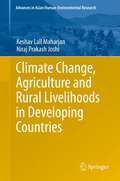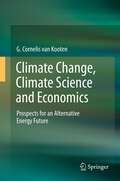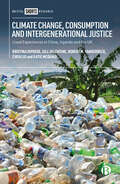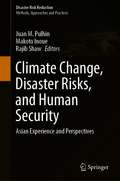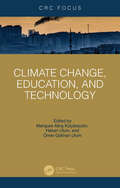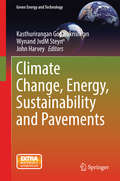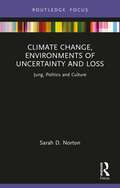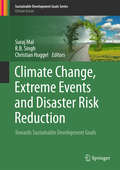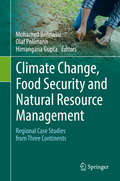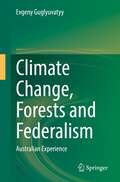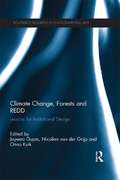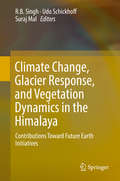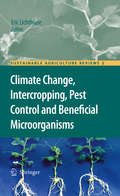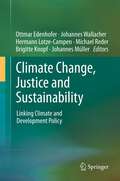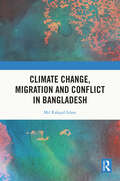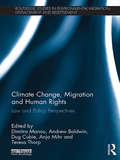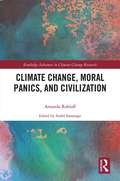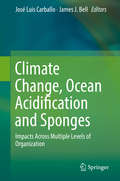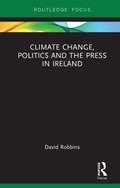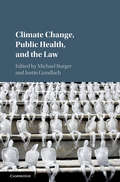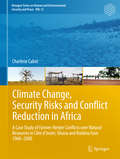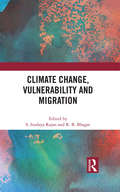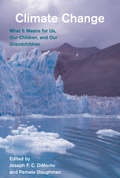- Table View
- List View
Climate Change, Agriculture and Rural Livelihoods in Developing Countries (Advances in Asian Human-Environmental Research)
by Keshav Lall Maharjan Niraj Prakash JoshiThis book is about climate change and its relation to agriculture and rural livelihoods. It starts by providing a basic understanding of climate change science followed by the relation of climate change to agriculture, the impact of which is discussed based on the particular impact of climate change on plant and animal physiology. The book further discusses the inclusion of the agriculture sector in various international climate change negotiations. It also reviews the cost and opportunities for agricultural projects through international climate change regimes, specifically the Clean Development Mechanism under the Kyoto Protocol. With this background, the book finally proceeds to an explanation of the methodologies used to assess the impact of climate change on agriculture and empirically discusses its impact on agriculture and rural livelihoods in Nepal.
Climate Change, Capitalism, and Corporations
by Christopher WrightClimate change is one of the greatest threats facing humanity, a definitive manifestation of the well-worn links between progress and devastation. This book explores the complex relationship that the corporate world has with climate change and examines the central role of corporations in shaping political and social responses to the climate crisis. The principal message of the book is that despite the need for dramatic economic and political change, corporate capitalism continues to rely on the maintenance of 'business as usual'. The authors explore the different processes through which corporations engage with climate change. Key discussion points include climate change as business risk, corporate climate politics, the role of justification and compromise, and managerial identity and emotional reactions to climate change. Written for researchers and graduate students, this book moves beyond descriptive and normative approaches to provide a sociologically and critically informed theory of corporate responses to climate change.
Climate Change, Climate Science and Economics: Prospects for an Alternative Energy Future
by G. Cornelis van KootenThis volume enables readers to understand the complexity associated with climate change policy and the science behind it. For example, the author describes the criticism and defense of the widely known "hockey stick" temperature graph derived from combining instrumental data and proxy temperature indications using tree ring, ice core and other paleoclimatic data. Readers will also learn that global warming cannot easily be avoided by reducing CO2 and other greenhouse gas emissions in rich countries. Not only is emissions reduction extremely difficult in rich countries, but demands such as the UN mandate to improve the lives of the poorest global citizens cannot be satisfied without significantly increasing global energy use, and CO2 emissions. Therefore, the author asserts that climate engineering and adaptation are preferable to mitigation, particularly since the science is less than adequate for making firm statements about the Earth's future climate. Readers will also learn that global warming cannot easily be avoided by reducing CO2 and other greenhouse gas emissions in rich countries. Not only is emissions reduction extremely difficult in rich countries, but demands such as the UN mandate to improve the lives of the poorest global citizens cannot be satisfied without significantly increasing global energy use, and CO2 emissions. Therefore, the author asserts that climate engineering and adaptation are preferable to mitigation, particularly since the science is less than adequate for making firm statements about the Earth's future climate.
Climate Change, Consumption and Intergenerational Justice: Lived Experiences in China, Uganda and the UK
by Gill Valentine Kristina DiproseThe United Nations 2030 Agenda for Sustainable Development makes climate change and responsible consumption key priorities for both industrialized and emerging economies. Moving beyond the Global North, this book uses innovative cross-national and cross-generational research with urban residents in China and Uganda, as well as the UK, to illuminate international debates about building sustainable societies and to examine how different cultures think about past, present and future responsibility for climate change. <p><p> The authors explore to what extent different nations see climate change as a domestic issue, whilst looking at local explanatory and blame narratives to consider profound questions of justice between those nations that are more and less responsible for, and vulnerable to, climate change.
Climate Change, Disaster Risks, and Human Security: Asian Experience and Perspectives (Disaster Risk Reduction)
by Rajib Shaw Makoto Inoue Juan M. PulhinThis book explores how climate change and disaster risks threaten human security in Asia. Climate change and disaster risks have emerged as major human security challenges in the twenty-first century, and are an imminent “threat multiplier” with the potential to harm the vital core of human life and curtail people’s freedom and ability to live with dignity. Climate change and disaster risks undermine the security of individuals, communities, nations, and the world, considering the increasing trend in the frequency and magnitude of hydro-meteorological disasters and the projections on their future adverse impacts. Despite recent advances in the literature, there is still a major gap in understanding the relationship and linkages between climate change, disaster risks, and human security, particularly as gleaned from the Asian experience. Asia is the world’s most vulnerable region in terms of the quantity and magnitude of impacts from various forms of disaster. At the same time, it has developed a number of innovative responses to address those risks, offering a wealth of experience. Exploring and capitalizing on the Asian perspective, this book provides valuable resource material for students, academics, researchers, policymakers, and development practitioners working in these areas.
Climate Change, Education, and Technology
by Ömer Gökhan Ulum Hakan Ulum Menşure Alkış KüçükaydınThe climate change crisis is the greatest challenge humanity has ever confronted. As human activities are the most significant cause for this crisis, the solution must come from within humanity. While global movements—NGOs, universities, municipal governments, etc.—are doing their part to combat the crisis, the role of education and technology cannot be emphasized enough. Education is necessary to enhance awareness, especially among the youth, generate solutions, and implement them. Technology contributes to this process by creating climate change-fighting solutions, accumulating and analysing data, and providing energy efficiency. Technology also enables the monitoring of the climate, the mitigation of its effects, and the enhancement of the environment. Therefore, climate change, education, and the use of technology should be addressed as a unit. In this volume, the authors integrate climate change, education, and technological applications.This book is comprehensive and offers readers a variety of perspectives, encouraging the generation of novel and inventive ideas. The collaboration of authors from various disciplines to address the issue brings about novel and intriguing perspectives.
Climate Change, Energy, Sustainability and Pavements (Green Energy and Technology)
by John Harvey Kasthurirangan Gopalakrishnan Wynand Jvdm SteynClimate change, energy production and consumption, and the need to improve the sustainability of all aspects of human activity are key inter-related issues for which solutions must be found and implemented quickly and efficiently. To be successfully implemented, solutions must recognize the rapidly changing socio-techno-political environment and multi-dimensional constraints presented by today's interconnected world. As part of this global effort, considerations of climate change impacts, energy demands, and incorporation of sustainability concepts have increasing importance in the design, construction, and maintenance of highway and airport pavement systems. To prepare the human capacity to develop and implement these solutions, many educators, policy-makers and practitioners have stressed the paramount importance of formally incorporating sustainability concepts in the civil engineering curriculum to educate and train future civil engineers well-equipped to address our current and future sustainability challenges. This book will prove a valuable resource in the hands of researchers, educators and future engineering leaders, most of whom will be working in multidisciplinary environments to address a host of next-generation sustainable transportation infrastructure challenges. "This book proposes a broad detailed overview of the actual scientific knowledge about pavements linked to climate change, energy and sustainability at the international level in an original multidimensional/multi-effects way. By the end, the reader will be aware of the whole global issues to care about for various pavement technical features around the world, among which the implications of modelling including data collection, challenging resources saving and infrastructures services optimisation. This is a complete and varied work, rare in the domain. " Dr. Agnes Jullien Research Director Director of Environmental, Development, Safety and Eco-Design Laboratory (EASE) Department of Development, Mobility and Environment Ifsttar Centre de Nantes Cedex- France "An excellent compilation of latest developments in the field of sustainable pavements. The chapter topics have been carefully chosen and are very well-organized with the intention of equipping the reader with the state-of-the-art knowledge on all aspects of pavement sustainability. Topics covered include pavement Life Cycle Analysis (LCA), pervious pavements, cool pavements, photocatalytic pavements, energy harvesting pavements, etc. which will all be of significant interest to students, researchers, and practitioners of pavement engineering. This book will no doubt serve as an excellent reference on the topic of sustainable pavements. " Dr. Wei-Hsing Huang Editor-in-Chief of International Journal of Pavement Research and Technology (IJPRT) and Professor of Civil Engineering National Central University Taiwan
Climate Change, Environments of Uncertainty and Loss: Jung, Politics and Culture (Focus on Jung, Politics and Culture)
by Sarah D. NortonFocusing on one of the most significant and critical issues facing the world today, this important book explores multiple aspects of climate change through the use of Jungian symbols and "signs" of this environmental shift, while diving deep into the politics of loss in reaction to climate chaos, uncertainty, and ambiguity.Despite the imminent threat of ecological crisis, many treat this existential crisis as something that can be pushed to the side, ignored, and denied. The loss of natural habitats, species, land, human life, and health continues, acknowledged or not. Unconsciously, a necessary process of grief is bubbling up from the depths as a reaction to this climate crisis. This grief, often disguised as anger or inaction, can lead to individual and political action if it is engaged consciously and directed with purpose. From forest fires, to melting ice, to bleached coral, and warming oceans, within the chapters of this book, each sign of our changing planet is explored in depth from multiple perspectives. Through this exploration, each is revealed as a Jungian symbol encompassing so much more than we consciously comprehend. Each symbol is brought to life in the context of this political, communal, and individual space of loss, transforming a subversive grieving process into creative, conscious action.This is essential and accessible reading for those within the fields of depth psychology, environmental sciences, humanities, and politics, as well as anyone wishing to gain more insight into the current climate crisis and their place within it.
Climate Change, Ethics and Human Security
by Karen O'Brien Asunción Lera St.Clair Berit KristoffersenPresenting human security perspectives on climate change, this volume raises issues of equity, ethics and environmental justice, as well as our capacity to respond to what is increasingly considered to be the greatest societal challenge for humankind. Written by international experts, it argues that climate change must be viewed as an issue of human security, and not an environmental problem that can be managed in isolation from larger questions concerning development trajectories, and ethical obligations towards the poor and to future generations. The concept of human security offers a new approach to the challenges of climate change, and the responses that could lead to a more equitable and sustainable future. Climate Change, Ethics and Human Security will be of interest to researchers, policy makers, and practitioners concerned with the human dimensions of climate change, as well as to upper-level students in the social sciences and humanities interested in climate change.
Climate Change, Extreme Events and Disaster Risk Reduction: Towards Sustainable Development Goals (Sustainable Development Goals Series)
by Christian Huggel R. B. Singh Suraj MalThis book discusses the science, causes, impacts and risk reduction strategies for climate change and disasters. It focuses on the use of traditional knowledge, new innovation and education to build a culture of safety and resilience at all levels in order to promote sustainable development goals in general and disaster risk reduction in particular. The global climate has changed substantially over the last century. There is strong evidence of global climate change in the form of increase in air and sea surface temperature, recession of glaciers, changes and shifting of climate regimes, increasing number of extreme events and sea levels changes. The increasing frequency of climate change induced disasters in particular is posing a threat to resilience, lives and livelihoods at global, regional and local levels. Major ecosystems of the world have experienced several climate induced disaster events in recent past. This book provides new insights into the occ urrence and impacts of climatic extremes and strategies for disaster risk reduction. It includes studies on rainfall and temperature trends, floods and drought disasters, weather and climatic related disasters in mountains, changes in plant activities, risk assessment and responses in different ecosystems of the world. The book is particularly useful for environmental and disaster managers, researchers and graduate students, as well as policy makers.
Climate Change, Food Security and Natural Resource Management: Regional Case Studies from Three Continents
by Mohamed Behnassi Olaf Pollmann Himangana GuptaThis book contributes to the on-going debates on climate change by focusing on the SDGs and exploring linkages between environmental change and food security as well as the relevance and need to consider the management of natural resources, especially water, soil and forest. Compared to relevant existing publications, this book covers case studies that capture the everyday realities of the local people and how they react and adapt to similar situations in different geographical settings. Each case study presented in this book gives a particular message. The strength of this book lies in the fact that it covers the most neglected topics in climate negotiations in spite of the fact that these decide the fate of millions of people around the world, especially the developing countries. By presenting a collection of case studies from Africa, Asia and Europe, this book encourages cross-continental knowledge sharing. The scope of the book ranges from impacts to mitigation and from in-field experiments to policy implementation. It contributes to the existing knowledge on climate-food nexus and connects climate change to sectors it could impact directly. All chapters in this book emphasise local ownership of strategy processes, effective participation from all levels, and high-level commitment. Besides being relevant for the academicians and scholars working in the field of climate change, forest and agriculture, it aims to catch interest of the policy makers and practitioners to understand ground realities for appropriate action. It is also bound to make an impact on the Non-Governmental Organizations around the world and in the three different continents that this book covers, considering the indigenous and local issues highlighted in this book.
Climate Change, Forests and Federalism: Australian Experience
by Evgeny GuglyuvatyyClimate change is one of the most serious global challenges facing humankind. Climate change has enormous environmental and economic implications, and finding a solution is a daunting task. The purpose of this book is to look at the global problem of climate change through the prism of an individual country's attempt to tackle this problem.This book begins with a discussion of the origins of climate change and the evolution of the international response to climate change. Key climate change mitigation actions and policies are considered to provide the necessary framework for analysing Australia's approach to climate change. Australia's climate change policy development is considered from a historical perspective. The book traces the evolution of the response to climate change, focusing on Australia as one of the Federal countries unable to adequately reduce greenhouse gas emissions due to the systematic failure of the Australian government to develop a common and effective approach to the problem of climate change. The book will be of interest to scholars and students of environmental law and the contemporary International and Australian climate change law.
Climate Change, Forests and REDD: Lessons for Institutional Design (Routledge Research in International Environmental Law)
by Joyeeta Gupta Nicolien van der Grijp Onno KuikA search for new methods for dealing with climate change led to the identification of forest maintenance as a potential policy option that could cost-effectively reduce greenhouse gas emissions, with the development of measures for Reducing Emissions from Deforestation and Forest Degradation (REDD). This book explores how an analysis of past forest governance patterns from the global through to the local level, can help us to build institutions which more effectively deal with forests within the climate change regime. The book assesses the options for reducing emissions from deforestation in developing countries under the international climate regime, as well as the incentives flowing from them at the national and sub national level and examines how these policy levers change human behaviour and interface with the drivers and pressures of land use change in tropical forests. The book considers the trade-offs between certain forestry related policies within the current climate regime and the larger goal of sustainable forestry. Based on an assessment of existing multi-level institutional forestry arrangements, the book questions how policy frameworks can be better designed in order to effectively and equitably govern the challenges of deforestation and land degradation under the global climate change regime. This book will be of particular interest to students and scholars of Law and Environmental Studies.
Climate Change, Glacier Response, and Vegetation Dynamics in the Himalaya: Contributions Toward Future Earth Initiatives
by Udo Schickhoff Rb Singh Suraj MalThis book provides information essential for anyoneinterested in climate and environmental change of the Himalayan region,including land and resource managers, environmental planners, conservationists,environmentalists, geographers, climatologists, ecologists, and students. Thebook is unique in its coverage of the current understanding of the science ofclimate change in the Himalayan mountain system and of the major impacts onphysical systems and ecosystems. The book gives an overview of the physicalscience basis of climate change and explains drivers and processes of glacierand vegetation dynamics. The book covers relevant aspects of accelerated climatechange observed in the Himalayan mountain system, and highlights the regionaldifferentiation of climatic changes and associated environmental modifications. The focus is on climate variability and change, and how physical systems andecosystems respond to climate change impacts. Consequences include impacts onphysical systems such as glacier shrinkage, glacial lake outburst floods,altered hydrological characteristics, permafrost warming and thawing, and massmovements on slopes. Climate change is also a powerful stressor on ecosystemsand induces range shifts of plant and animal species and alterations in termsof phenology, biomass, plant cover, plant group dominance and speciescomposition. Thus, ecosystem structure and functioning will be stronglyaffected. The book has an introductory chapter followed by a sectionon climate change, a section on impacts on glaciers and hydrology, and asection on vegetation dynamics. Each section has several chapters presentingkey concepts, major drivers and key processes of environmental change in the Himalayan region from different perspectives. Climate change impacts inthe Himalaya have not been studied in much detail, and respective findings werenot presented so far in a comprehensive overview. This book summarizes thecurrent knowledge of interactions between climate change and the dynamics ofglaciers, hydrology, and vegetation.
Climate Change, Intercropping, Pest Control and Beneficial Microorganisms (Sustainable Agriculture Reviews #2)
by Eric LichtfouseSustainable agriculture is a rapidly growing field aiming at producing food and energy in a sustainable way for humans and their children. Sustainable agriculture is a discipline that addresses current issues such as climate change, increasing food and fuel prices, poor-nation starvation, rich-nation obesity, water pollution, soil erosion, fertility loss, pest control, and biodiversity depletion. Novel, environmentally-friendly solutions are proposed based on integrated knowledge from sciences as diverse as agronomy, soil science, molecular biology, chemistry, toxicology, ecology, economy, and social sciences. Indeed, sustainable agriculture decipher mechanisms of processes that occur from the molecular level to the farming system to the global level at time scales ranging from seconds to centuries. For that, scientists use the system approach that involves studying components and interactions of a whole system to address scientific, economic and social issues. In that respect, sustainable agriculture is not a classical, narrow science. Instead of solving problems using the classical painkiller approach that treats only negative impacts, sustainable agriculture treats problem sources. Because most actual society issues are now intertwined, global, and fast-developing, sustainable agriculture will bring solutions to build a safer world. This book series gathers review articles that analyze current agricultural issues and knowledge, then propose alternative solutions. It will therefore help all scientists, decision-makers, professors, farmers and politicians who wish to build a safe agriculture, energy and food system for future generations.
Climate Change, Justice and Sustainability: Linking Climate and Development Policy
by Johannes Müller Hermann Lotze-Campen Johannes Wallacher Michael Reder Brigitte Knopf Ottmar EdenhoferAnalysing and synthesising vast data sets from a multitude of disciplines including climate science, economics, hydrology and agricultural research, this volume seeks new methods of combining climate change mitigation, adaptation, development, and poverty reduction in ways that are effective, efficient and equitable. A guiding principle of the project is that new alliances of state and non-state sector partners are urgently required to establish cooperative responses to the threats posed by climate change. This volume offers a vital policy framework for linking our response to this change with progressive principles of global justice and sustainable development.
Climate Change, Migration and Conflict in Bangladesh
by Md Rafiqul IslamThis book explores the relationship between climate-change-induced migration and conflict in Bangladesh – one of the most ecologically fragile countries in the world. It explores why people migrate from their original place of land; and how the migration of people with a different background to an ethnically distinctive region due to environmental changes can become a source of conflict and violence between the host peoples and migrants. The volume focuses on Chittagong Hill Tracts (CHT) which has experienced long-standing ethno-political conflict due to migration caused by floods, cyclone, sea-level rise and disasters. It traces the history of the ethnic conflict in the region and presents key findings from the field, as well as the dynamics of everyday politics in the region. This volume also highlights how internally climate-displaced people generate violence and civil strife in the major urban cities through their settlements in slums. The volume will be of great interest to scholars and researchers of environmental studies, human geography, migration and diaspora studies, public policy, social anthropology and South Asian studies.
Climate Change, Migration and Human Rights: Law and Policy Perspectives (Routledge Studies in Environmental Migration, Displacement and Resettlement)
by Anja Mihr Dug Cubie Dimitra Manou Andrew Baldwin Teresa ThorpClimate Change already having serious impacts on the lives of millions of people across the world. These impacts are not only ecological, but also social, economic and legal. Among the most significant of such impacts is climate change-induced migration. The implications of this on human rights raise pressing questions, which require serious scholarly reflection. Drawing together experts in this field, Climate Change, Migration and Human Rights offers a fresh perspective on human rights law and policy issues in the climate change regime by examining the interrelationships between various aspects of human rights, climate change and migration. Three key themes are explored: understanding the concepts of human dignity, human rights and human security; the theoretical nexus between human rights, climate change and migration or displacement; and the practical implications and challenges for lawyers and policy-makers of protecting human dignity in the face of climate change and displacement. The book also includes a series of case studies from Alaska, Bangladesh, Kenya and the Pacific islands which aim to improve our understanding of the theoretical and practical implications of climate change for human rights and migration. This book will be of great interest to scholars of environmental law and policy, human rights law, climate change, and migration and refugee studies.
Climate Change, Moral Panics and Civilization (Routledge Advances in Climate Change Research)
by Amanda RohloffIn recent years, interest in climate change has rapidly increased in the social sciences and yet there is still relatively little published material in the field that seeks to understand the development of climate change as a perceived social problem. This book contributes to filling this gap by theoretically linking the study of the historical development of social perceptions about ‘nature’ and climate change with the figurational sociology of Norbert Elias and the study of moral panics. By focusing sociological theory on climate change, this book situates the issue within the broader context of the development of ecological civilizing processes and comes to conceive of contemporary campaigns surrounding climate change as instances of moral panics/civilizing offensives with both civilizing and decivilizing effects. In the process, the author not only proposes a new approach to moral panics research, but makes a fundamental contribution to the development of figuration sociology and the understanding of how climate change has developed as a social problem, with significant implications regarding how to improve the efficacy of climate change campaigns. This highly innovative study should be of interest to students and researchers working in the fields of sociology, environment and sustainability, media studies and political science.
Climate Change, Ocean Acidification and Sponges
by José Luis Carballo James J. BellWhile sponges represent a very simple group of organisms, which are represented by over 8000 species, there is considerable interest in the increasing role they may play in future marine ecosystems. While we still have a comparatively limited understanding of how sponges will respond to ocean warming and acidification there is evidence that some species may have the ability to acclimate or even adapt to these stressors. This comprehensive collection of articles describes our current understanding of the impacts of ocean acidification and warming on sponges across multiple levels of biological organisation, and from the geological past to the present. With expert contributions from across the world this book represents the most up-to-date view on sponge responses to climate change. This book will be of interest to a wide audience of marine scientists and managers, who are grappling with how to manage, conserve and protect marine ecosystems.
Climate Change, Politics and the Press in Ireland (Routledge Focus on Environment and Sustainability)
by David RobbinsMedia coverage of climate change has attracted much scholarly attention because the extent of such coverage has an agenda-setting effect and because the ways in which the coverage is framed can influence public perception of and engagement with the issue. However, certain gaps in our understanding of the processes whereby such coverage is produced remain. The competition among strategic actors to influence media framing strategies is poorly understood, and the perspectives of journalists and editors are largely absent from literature. With a view to advancing our understanding of the "frame competition" around climate change and to presenting the perspectives of journalists regarding climate change as a journalistic topic, this book presents an in-depth case history of media coverage of climate change in Ireland. First, the extent of media attention for climate change is established, and the way in which such coverage is framed is also examined. Through a series of interviews, including rare and privileged access to government ministers, their media advisors, and journalists and editors, the book uncovers the contest to establish a dominant framing. The main objective of this book is to advance our understanding of the contest to establish the dominant framing of climate change in the media discourse. Although focussed on Ireland, its conclusions are of value to those seeking to better understand the dynamics of media coverage of climate change in other contexts. This book will be of great interest to students and scholars of climate change, environmental policy, media and communication studies, and Irish politics.
Climate Change, Public Health, and the Law
by Michael Burger Justin GundlachClimate Change, Public Health, and the Law provides the first comprehensive explication of the dynamic interactions between climate change, public health law, and environmental law, both in the United States and internationally. Responding to climate change and achieving public health protections each require the coordination of the decisions and behavior of large numbers of people. However, they also involve interventions that risk compromising individual rights. The challenges involved in coordinating large-scale responses to public health threats and protecting against the invasion of rights, makes the law indispensable to both of these agendas. Written for the benefit of public health and environmental law professionals and policymakers in the United States and in the international public health sector, this volume focuses on the legal components of pursuing public health goals in the midst of a changing climate. It will help facilitate efforts to develop, improve, and carry out policy responses at the international, federal, state, and local levels.
Climate Change, Security Risks and Conflict Reduction in Africa: A Case Study of Farmer-Herder Conflicts over Natural Resources in Côte d’Ivoire, Ghana and Burkina Faso 1960–2000 (Hexagon Series on Human and Environmental Security and Peace #12)
by Charlène CabotMillionsof people are already affected by weather-related shocks every year in WestAfrica and climate change is highly likely to increase these threats. In thewake of climate change, rising temperatures, increasingly irregular rainfalland more frequent natural hazards will endanger the ways of life of vulnerablepopulation groups in this region and destabilize their human security. A surgein violence and conflicts could take place. One of the conflict constellationscould be between farmers and herders. These groups are highly vulnerable toclimate change due to their dependence on natural resources Millions of people are already affected by weather-related shocks every year in West Africa and climate change is highly likely to increase these threats. In the wake of climate change, rising temperatures, increasingly irregular rainfall and more frequent natural hazards will endanger the ways of life of vulnerable population groups in this region and destabilize their human security. A surge in violence and conflicts could take place. One of the conflict constellations could be between farmers and herders. These groups are highly vulnerable to climate change due to their dependence on natural resources for their subsistence. Furthermore, they are historically prone to enter into conflict over issues of access to natural resources. However, social, economic and political circumstances fundamentally influence environmental conflicts. There might thus be opportunities to face the societal challenges of climate change in a peaceful way and the political and institutional framework could play an important role in reducing conflict and violence. In order to explore such a path, this study analyses the potential of political factors (policies and institutions) for the reduction of climate-change-induced or aggravated conflicts between farmers and herders. After a theoretical demonstration, a case study of agro-pastoral conflicts in Burkina Faso, Côte d'Ivoire, and Ghana is conducted. theirsubsistence. Furthermore, they are historically prone to enter into conflictover issues of access to natural resources. However, social, economic andpolitical circumstances fundamentally influence environmental conflicts. Theremight thus be opportunities to face the societal challenges of climate changein a peaceful way and the political and institutional framework could play animportant role in reducing conflict and violence. In order to explore such apath, this study analyses the potential of political factors (policies and institutions)for the reduction of climate-change-induced or âe'aggravated conflicts betweenfarmers and herders. After a theoretical demonstration, a case study ofagro-pastoral conflicts in Burkina Faso, Côte d'Ivoire, and Ghana is conducted.
Climate Change, Vulnerability and Migration
by S. Irudaya Rajan R. B. BhagatThis book highlights how climate change has affected migration in the Indian subcontinent. Drawing on field research, it argues that extreme weather events such as floods, droughts, cyclones, cloudbursts as well as sea-level rise, desertification and declining crop productivity have shown higher frequency in recent times and have depleted bio-physical diversity and the capacity of the ecosystem to provide food and livelihood security. The volume shows how the socio-economically poor are worst affected in these circumstances and resort to migration to survive. The essays in the volume study the role of remittances sent by migrants to their families in environmentally fragile zones in providing an important cushion and adaptation capabilities to cope with extreme weather events. The book looks at the socio-economic and political drivers of migration, different forms of mobility, mortality and morbidity levels in the affected population, and discusses mitigation and adaption strategies. The volume will be of great interest to scholars and researchers of environment and ecology, migration and diaspora studies, development studies, sociology and social anthropology, governance and public policy, and politics.
Climate Change, second edition: What It Means for Us, Our Children, and Our Grandchildren (American and Comparative Environmental Policy)
by Pamela Doughman Joseph F.C. DiMentoAn updated and accessible account of what science knows about climate change, incorporating the latest scientific findings and policy initiatives.Most of us are familiar with the term climate change but few of us understand the science behind it. We don't fully comprehend how climate change will affect us, and for that reason we might not consider it as pressing a concern as, say, housing prices or unemployment. This book explains the scientific knowledge about global climate change clearly and concisely in engaging, nontechnical language, describes how it will affect all of us, and suggests how government, business, and citizens can take action against it.This completely revised and updated edition incorporates the latest scientific research and policy initiatives on climate change. It describes recent major legislative actions, analyzes alternative regulatory tools including new uses of taxes and markets, offers increased coverage of China and other developing nations, discusses the role of social media in communicating about climate change, and provides updated assessments of the effects of climate change.The book first explains the basic scientific facts about climate change and its global impact. It discusses the nature of scientific consensus and the strong consensus of mainstream science on climate change. It then explores policy responses and corporate actions in the United States and the rest of the world, discusses how the communication of climate change information by journalists and others can be improved, and addresses issues of environmental justice—how climate change affects the most vulnerable populations and regions. We can better tackle climate change, this book shows us, if we understand it.
